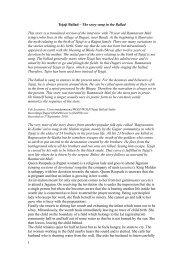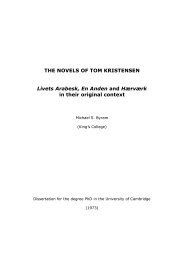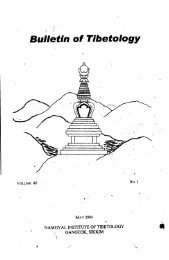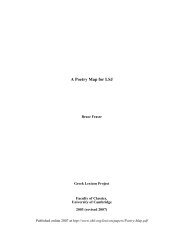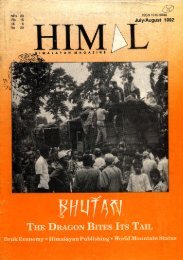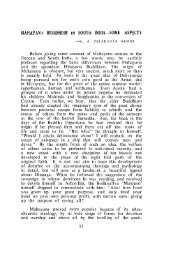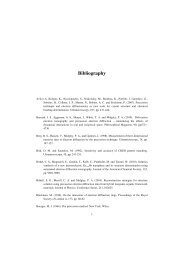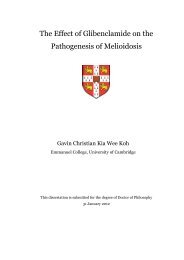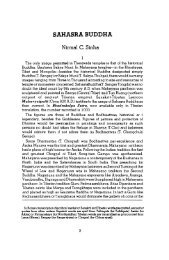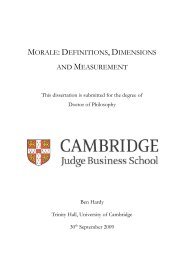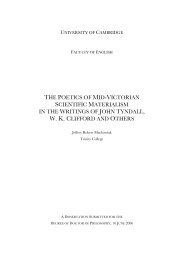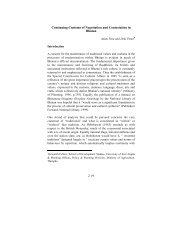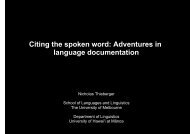The Crusades, the Genoese and the Latin East - DSpace at ...
The Crusades, the Genoese and the Latin East - DSpace at ...
The Crusades, the Genoese and the Latin East - DSpace at ...
Create successful ePaper yourself
Turn your PDF publications into a flip-book with our unique Google optimized e-Paper software.
Pope Innocent III <strong>and</strong> <strong>the</strong> maritime communities:<br />
Innocent III was concerned with <strong>the</strong> possibility th<strong>at</strong> <strong>the</strong> trading communities might not fully<br />
cooper<strong>at</strong>e with <strong>the</strong> crusade's leaders. As l<strong>at</strong>e as <strong>the</strong> autumn of 1216 <strong>the</strong> <strong>Genoese</strong> had not yet taken<br />
<strong>the</strong> cross. James Powell explains this in <strong>the</strong> light of <strong>the</strong> war between Genoa <strong>and</strong> Pisa: `despite <strong>the</strong><br />
success of this preaching [of James of Vitry]... <strong>the</strong> <strong>Genoese</strong> were not yet ready to commit a<br />
formal contingent to <strong>the</strong> crusade.... ' 299 Powell, however, looked more into <strong>the</strong> high diplomacy of<br />
<strong>the</strong> maritime powers <strong>and</strong> general European affairs ra<strong>the</strong>r than <strong>the</strong> commercial consider<strong>at</strong>ions of<br />
<strong>the</strong> Italian cities. <strong>The</strong> pope's concern is evident already in <strong>the</strong> letter Quia major from 1213. It<br />
seems th<strong>at</strong> Innocent's <strong>at</strong>titude was ambiguous. On <strong>the</strong> one h<strong>and</strong>, he was dependent on <strong>the</strong> Italians<br />
for <strong>the</strong> transport<strong>at</strong>ion of <strong>the</strong> crusade's armies; none<strong>the</strong>less, he was clearly concerned with <strong>the</strong>ir<br />
contradictory commercial interests. <strong>The</strong> section directed to <strong>the</strong> maritime cities in Quia major<br />
begins with a request for help: `A civitalibus vero marilimjs navale subsidium poslulamus. '300<br />
This is followed by permission to <strong>the</strong> clerics to offer indulgences. However, <strong>the</strong> second time <strong>the</strong><br />
maritime cities are mentioned is in a section th<strong>at</strong> forbids piracy under <strong>the</strong> thre<strong>at</strong> of<br />
excommunic<strong>at</strong>ion. Finally, <strong>the</strong>re is a warning not to sell arms to <strong>the</strong> Saracens, in which Innocent<br />
details exactly wh<strong>at</strong> he means by war m<strong>at</strong>erials:<br />
Innovamus preterea excommunic<strong>at</strong>ionis sententiam in L<strong>at</strong>eranensi concilio promulg<strong>at</strong>am<br />
adversus eos, qui Sarracenis arma, ferrum et lignamina deferunt galearum, quique in<br />
pir<strong>at</strong>icis Sarracenorum navibus curam gubern<strong>at</strong>ionis exercent, eosque rerum suarum<br />
priv<strong>at</strong>ione multari et capientjum servos, si capti fuerint, fore censemus.<br />
i01<br />
Exactly how worried Innocent was about <strong>the</strong> cooper<strong>at</strong>ion of <strong>the</strong> maritime cities can be<br />
seen in <strong>the</strong> following instruction, which applied especially to <strong>the</strong>m, in which lie ordered<br />
additional preaching in <strong>the</strong> maritime cities: `precipientes, ut per omnes urbes marilimas diebus<br />
Dominicis et festivis hujusmodi sententia publice innovetur. '302 Many details were still missing in<br />
this letter. When were <strong>the</strong> merchants expected to stop <strong>the</strong>ir commerce with Egypt? In May 1213<br />
<strong>the</strong> letters were sent around Europe. <strong>The</strong> preachers presumably followed <strong>the</strong>ir orders <strong>and</strong> read <strong>the</strong><br />
instructions every Sunday <strong>and</strong> during <strong>the</strong> holidays. <strong>The</strong> regular preaching was probably supposed<br />
to encourage crusading enthusiasm, but also to scare <strong>the</strong> Italians from <strong>the</strong> consequences of<br />
disobedience. However, <strong>the</strong> pope said th<strong>at</strong> <strong>the</strong> excommunic<strong>at</strong>ion would be announced in <strong>the</strong><br />
L<strong>at</strong>eran Council, which meant th<strong>at</strong> <strong>the</strong> merchants had <strong>at</strong> least two more years before <strong>the</strong>y had to<br />
worry about withholding <strong>the</strong>ir trade. Even more important was <strong>the</strong> fact <strong>the</strong> king of Jerusalem John<br />
of Brienne followed <strong>the</strong> pope's behest in 1212 <strong>and</strong> signed a four-year truce with Egypt to last<br />
299 Powell, An<strong>at</strong>omy of a Crusade, p. 68.<br />
300 `Quia<br />
maior', p. 93.<br />
301<br />
`Quia maior', p. 95.<br />
302 'Quia maior, p. 95.<br />
92



